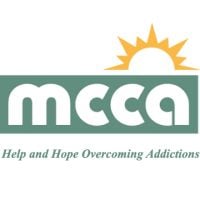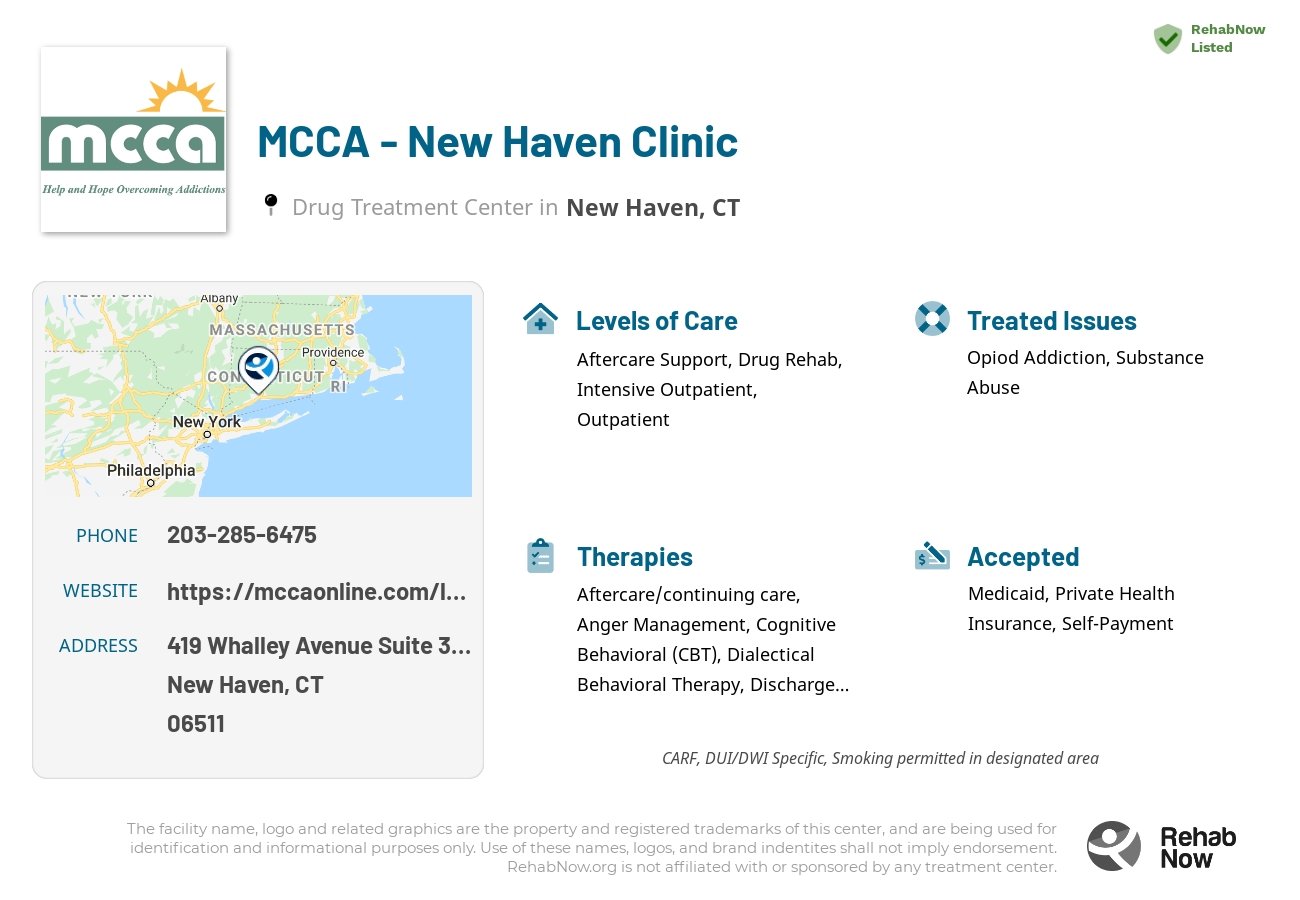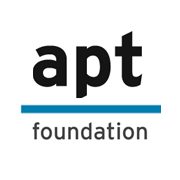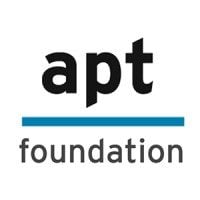MCCA - New Haven Clinic
Drug Rehab Center in New Haven, Connecticut
MCCA - New Haven Clinic is an accredited addiction treatment facility in Connecticut, offering a wide range of residential and outpatient services, such as detox, dual diagnosis care, aftercare support, intensive outpatient programs and more, for individuals struggling with opioid addiction, substance abuse and mental health issues since 1972.
About This New Haven, CT Facility
MCCA - New Haven Clinic, located in New Haven, CT, is dedicated to providing help and instilling hope for individuals, families, and organizations working to overcome addictions. This addiction treatment facility offers a comprehensive range of services in a supportive setting.
The clinic's mission is rooted in empowering those affected by substance abuse and addiction, guiding them towards recovery and prevention. With a focus on compassion and evidence-based practices, MCCA - New Haven Clinic strives to create a path to lasting sobriety.
Accredited by CARF (Commission on Accreditation of Rehabilitation Facilities), the facility offers a wide array of treatment methods and levels of care, including:
- Aftercare support services
- Drug rehabilitation programs
- Intensive outpatient programs
- Outpatient programs
- Detoxification services
- Residential levels of care
MCCA - New Haven Clinic specializes in treating individuals suffering from opioid addiction, substance abuse, dual diagnosis, drug addiction, and mental health issues. The facility's comprehensive approach addresses the unique needs of each individual, providing tailored treatment plans and support.
For those struggling with opioid addiction, MCCA - New Haven Clinic offers a range of services to help individuals overcome their dependence and regain control of their lives. Through a combination of evidence-based therapies, medication-assisted treatment, and supportive counseling, the facility aims to guide individuals towards long-term recovery and a fulfilling, substance-free life.
Genders
Ages
Modality
Additional
Accreditations

CARF
The Commission on Accreditation of Rehabilitation Facilities (CARF) is a non-profit organization that specifically accredits rehab organizations. Founded in 1966, CARF's, mission is to help service providers like rehab facilities maintain high standards of care.
Conditions and Issues Treated
Using both legal medications and illegal substances in order to maintain an addiction is substance abuse. Illegal substances can become addictive after a single use. If you are obtaining legal medications illegally, you may be suffering from substance abuse.
Fortunately facilities like MCCA - New Haven Clinic in New Haven, CT are here to help.
Opioid addiction treatment facilities in Connecticut, like MCCA - New Haven Clinic cover both illegal and prescription opioids abuse. Most plans include detoxification and subsequent medications to ease the process. Behavioral therapies and counseling are also necessary to resolve the root cause of addiction.
Levels of Care Offered
This center offers a variety of custom treatment tailored to individual recovery. Currently available are Aftercare Support, Detox, Drug Rehab, Intensive Outpatient, Outpatient, Residential, with additional therapies available as listed below.
Detox is a drug rehab process that is designed to remove the drug addict from the drug safely. The problem with solely using detox as a sobriety tool is that it alone provides no therapy or counseling. If a person goes through detox and returns to their everyday life, they may begin using again once the detox has worn off.
Detox does not help with cravings, so for some addicts, this can be extremely difficult and should be both done and supervised by medical professionals. Aftercare is crucial, so selecting a facility that offers additional services is important.
An outpatient treatment program is set up to help with alcohol or drug addiction, or a co-occurring disorder. The patient must attend the Connecticut facility for their therapy and other programs but are able to return home each night. The frequency of mandatory attendance decreases after much of MCCA - New Haven Clinic‘s program is complete.
Residential treatment programs are those that offer housing and meals in addition to substance abuse treatment. Rehab facilities that offer residential treatment allow patients to focus solely on recovery, in an environment totally separate from their lives. Some rehab centers specialize in short-term residential treatment (a few days to a week or two), while others solely provide treatment on a long-term basis (several weeks to months). Some offer both, and tailor treatment to the patient’s individual requirements.
Treatment is just the first step to maintaining sobriety. After treatment, aftercare support at MCCA - New Haven Clinic helps the individual adjust to a life without substances. This support may involve a sober living home in or near New Haven, CT, career counseling, or educational assistance. This is when a relapse prevention plan begins to take shape.
MCCA - New Haven Clinic‘s Therapies & Programs
Treatment programs include individual therapy for the greatest chances of success. Customized individual therapy is counseling involving you and your MCCA - New Haven Clinic counselor. Individual therapy leads to greater peace and understanding about your triggers for addiction.
When family members are more proactive and involved in the treatment procedure, it encourages the patient to advance his or her progress. Moreover, it shouldn’t be ignored that genetics play a role when it comes to addiction, so it’s better to approach the problem as a unit. Also, with proper education, family members can help an individual avoid addiction triggers and guide him or her in making lifestyle changes necessary for his or her sobriety.
Dialectical Behavior Therapy (DBT) helps those who attend MCCA - New Haven Clinic understand how their feelings, beliefs, and thoughts affect their behaviors. DBT is particularly useful for people with self-harming behaviors, as well as those with substance abuse disorders. DBT teaches people how to tolerate distress, regulate their emotions, and how to become mindful.
Cognitive Behavioral Therapy (CBT) is a type of psychotherapy that focuses on the underlying thoughts and behaviors that caused the problem of addiction in the first place and may cause a relapse. Negative feelings are common in substance abuse disorders, and if not recognized, they can cause co-occurring disorders.
CBT involves strategies that help to change the thinking and behavioral pattern by cognitive restructuring. In simple terms, it helps to remove negative thoughts and provides long-term benefits. Also, CBT promotes self-awareness, self-control, and healthy ways to respond to negative thoughts. It can be administered as a mono-therapy as well as a part of combination therapy.
Payment Options Accepted
For specific insurance or payment methods please contact us.
Is your insurance accepted?
Ask an expert, call (888) 674-0062
Midwestern Connecticut Council on Alcoholism Associated Centers
Discover treatment facilities under the same provider.
- MCCA McDonough House and Detox - Danbury in Danbury, CT
- MCCA Danbury Outpatient Clinic in Danbury, CT
- MCCA Derby Outpatient Clinic in Derby, CT
- MCCA - Trinity Glen Women's Program in Kent, CT
- Midwestern Connecticut Council on Alcoholism - Bridgeport in Bridgeport, CT
Learn More About Midwestern Connecticut Council on Alcoholism Centers
Additional Details
Specifics, location, and helpful extra information.
New Haven, Connecticut 6511 Phone Number(203) 285-6475 Meta DetailsUpdated April 15, 2024
Staff Verified
What else do people call MCCA – New Haven Clinic?
People have occasionally also searched for “MCCA in Connecticut”
Patient Reviews
There are no reviews yet. Be the first one to write one.
New Haven, Connecticut Addiction Information
Connecticut has a higher rate of substance abuse and addiction than the national average. The state ranks in the top 10 in the country for illicit drug dependence among those ages 18 to 25. In 2010, there were 9,211 people admitted to an alcohol treatment facility for alcohol abuse combined with a secondary drug. Connecticut ranked fifth in the United States of America for the number of fatalities involving drunk driving in 2014.
There are 9,000 people addicted to drugs in New Haven, Connecticut. The most common drugs are methamphetamines and marijuana. Alcohol is also abused by many residents. 20% of Connecticut residents have a substance abuse disorder, and 28,409 people died from drug overdoses in 2015. Drug treatment centers in New Haven, CT, offer detoxification. The therapeutic portion of treatment may involve individual counseling, group therapy, and recreational activities.
Treatment in Nearby Cities
- Putnam, CT (68.9 mi.)
- Thompson, CT (71.8 mi.)
- Greenwich, CT (40.8 mi.)
- Portland, CT (23.7 mi.)
- Higganum, CT (23.7 mi.)
Centers near MCCA - New Haven Clinic
The facility name, logo and brand are the property and registered trademarks of MCCA - New Haven Clinic, and are being used for identification and informational purposes only. Use of these names, logos and brands shall not imply endorsement. RehabNow.org is not affiliated with or sponsored by MCCA - New Haven Clinic.










